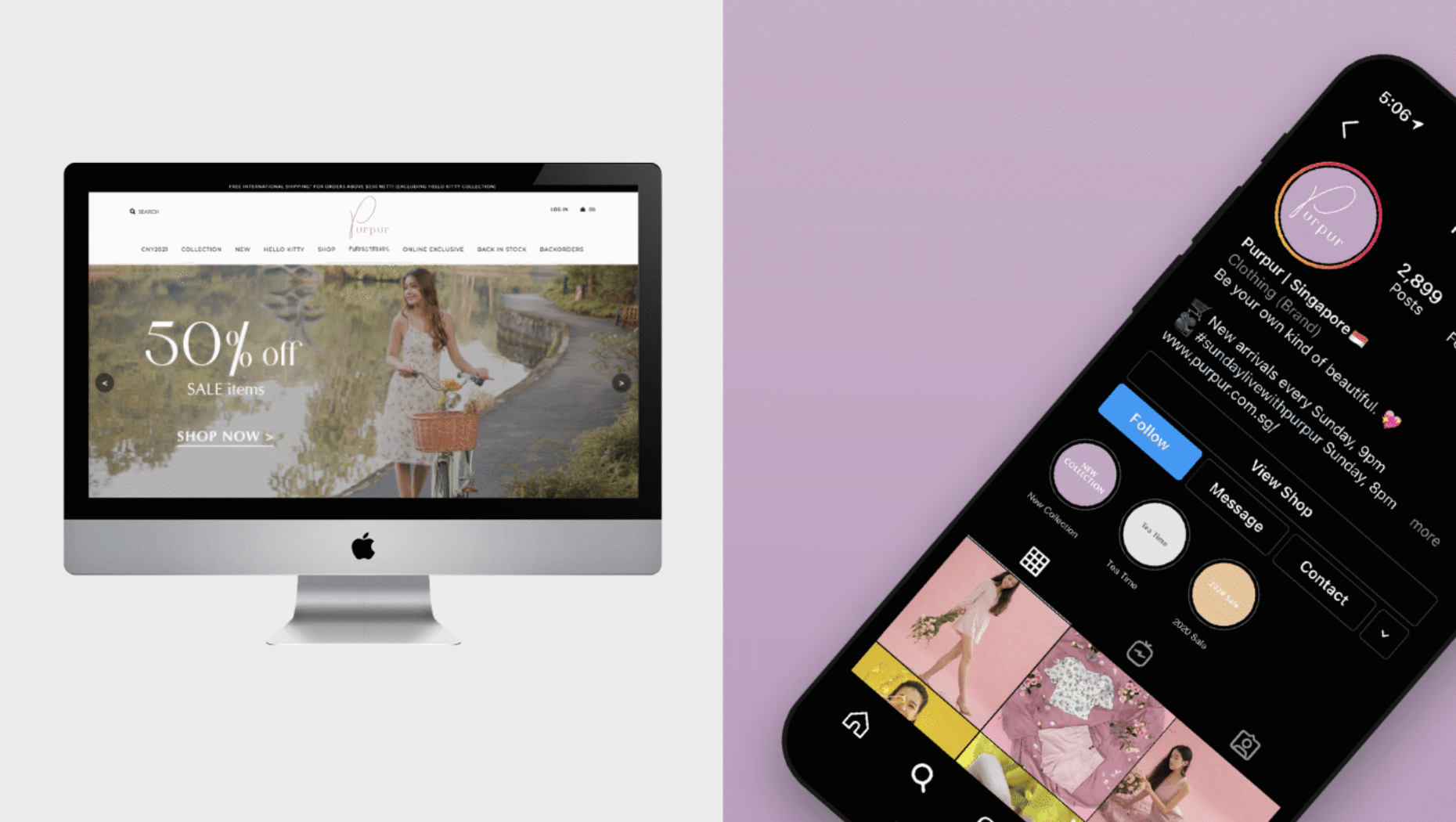Fostering Deeper Connections with your Target Audience by Having a Brand Personality: Purpur

In this two-part case study, we’ll be taking a closer look at an extremely important aspect of branding – brand personality. We’ll focus on how it helps brands go beyond competing on product and quality to foster a sense of belonging to their customers, in turn deepening the relationship between brand and consumer.
Just like humans with personality traits that we are attracted to or put off by, brands too, have personalities that cause the same effect. These traits help brands be more appealing and attractive – and once accepted by consumers, they will remain loyal, supportive, and be less critical of the brand.
For example, when interacting with people we’ve met for the first time, some of us are naturally drawn to people who are more outspoken and energetic because of their forthcoming attitude. On the contrary, others prefer having conversations with those who are more private and deep-minded as they can command respect without being intimidating.

It’s no different when it comes to brands. In our current day and age, especially with the younger generation, studies have shown that consumers are more likely to purchase from brands that they can align to, both values and personality-wise.
For example, if a consumer is environmentally conscious, they’d most likely purchase from brands who are as well. Just like how you’d remain lasting friends with someone you can click with, you’d probably continue purchasing from a brand that you can vibe with.
All these marks the importance of having a brand personality for brands nowadays. But what exactly is it, and why does it matter so much?
Brand Personality
Brand personality is having a set of human characteristics – for example, down-to-earth, daring, reliable, charming – attributed to your brand name. An effective brand personality is when consumers can relate to your brand, ultimately fostering brand recognition, loyalty, and influence.

Although there are many different brands who might sell similar items to yours, ultimately, brand personality is what differentiates your brand from others. Charming your consumers with your brand personality would mean that you’ve earned a loyal customer for life.
When your brand has a consistent set of human traits that a specific consumer segment enjoys, they will want to share your brand and spread the word to their friends, eventually augmenting your brand’s influence and market share.
Essentially, your vibe attracts your tribe. The brand personality that you have will help you foster deeper connections with the people you want as customers.
Purpur
Using a recent rebranding project as an example, we’ll show you how we discovered Purpur’s brand personality and intertwined it in their brand system to deepen the connection between brand and consumer.
Established in 2002, Purpur has been around for the past two decades in the local women’s fashion scene. With physical stores in shopping malls all over Singapore, Purpur realised that they had difficulty building rapport with the younger generation of Millennials and Generation Zs. Yet at the same time, they had a loyal consumers base of long-standing customers who’d grown from students to mothers and remained faithful over the years.
The next step was to find out why Purpur couldn’t engage with the younger generation. The first assumption most would make is that their marketing campaigns are ineffective, causing them to fail to reach this group of customers. The second assumption? Perhaps their marketing budget wasn’t enough.
However, in a rebranding exercise, we need to analyse beyond all these.
One main factor for Purpur’s rebranding exercise was because they needed to revamp and enhance their brand personality. By rediscovering their brand personality, they would be able to connect with their consumers through the lively character that she projects. The personality of a brand is closely related to the personality of the brands founders, which helps the entire brand be authentic and reflexive no matter the situation, rather than fake and exaggerated.
For example, if – for one moment – a brand claims to be environmentally conscious but is caught for their unethical business practices the next, consumers would know that their personality was faked for the sake of appealing to a wider target audience and increasing sales.
Hence, authenticity plays a large part in fostering the connection between your brand and her consumers. Without authenticity, there is no trust, and without trust, there will be no relationship.
That’s why we based Purpur’s personality off their founders, two incredibly down-to-earth, sincere, optimistic and humble people. In this era, Purpur wants to move closer to the younger crowd by seeking out more channels of communication and building deeper relationships with them. These days, it is no longer a “Thank you, and Goodbye” after-sales relationship but goes beyond that.
As part of a symbiotic relationship, customers these days want to be a part of a brand’s community but are also important for building Purpur’s brand as well. To identify these supporters of Purpur within the younger crowd, we must attract and draw them in through Purpur’s personality traits.
There is a diverse range of personality traits to choose from. However, it’s important to note that a brand must keep their personality traits coherent. For example, a brand can’t be both polished and refined yet be crude and boorish in their verbal expressions.
Hence, for Purpur, we went for an overall feel-good personality that would bring joy and happiness to their consumers.
Discovering her personality was just the first step, however. The next step would be to put it into action. How did we manage to do this with Purpur?
Firstly, we dove deeper to discover what her current customers truly feel about Purpur
- Trustworthy
- Casual
- Fun
- Outspoken
- Imaginative
With these traits, we then set the following goals as a second step:
- For her customers to feel delighted when associating with the brand, be it in their physical stores, or through digital touchpoints (for e.g., social media, EDMs, or even advertisements)
- For Purpur to be a part of her customers’ journey by building genuine relationships with them, getting to know them well, and being a part of their life experiences.
- For Purpur to channel positive energy toward her customers by sharing stories they can relate to, no matter their age.
Hence, we conducted an audit on her brand assets and communications to figure out if they’ve portrayed this personality to their Purpur community. Since they were moving into the digital sphere as well, we had to analyse both online and offline touchpoints.
What we realised was that:
- The brand did well in terms of proffering her consumers a good brand experience – they felt welcome and happy with the level of service they received. However, when we visited her online touchpoints – website and social media – these personality traits were missing.

- The frontline staff knew their customers well, such as the colours they like, jobs they currently hold, kids they might have, and even their holiday plans. When it came to the digital assets, however, there is little interaction between the brand and her customers. Even though the customers would have liked to interact with Purpur, they were unable to give their thoughts and experiences with the brands due to their lack of communication channels.
- Visiting a brand is often times like visiting an old friend. Enjoying the vibe, mood, and interaction is what keeps the friendship going strong. Purpur was doing great with her offline experience because her service staff are chatty and are always ready to share stories about themselves or the brand. When it came to the online sphere, this sentiment faded.
Hence, we needed to change all these through the rebranding project.
In the next part of this case study, we will be sharing how we developed her personality traits and how we activated their personality throughout her communications. Prior to that, let’s recap the benefits of having a personality for your brand.
The Importance of Brand Personality
Many brands these days have yet to discover their brand personality, as they do not believe that it will help them in the long run. However, in a time and age where consumers look beyond mere products and quality, it is time to begin looking at building a living, breathing brand.
A brand with personality and character is more capable of building emotional connections with her customers to foster loyalty than one without. To truly thrive, brands must build meaningful relationships with their customers outside of product and price. It’s a highly competitive economy out there, and brands who do not have a clear distinction from others are at risk of losing out.
Every brand has a personality – it just depends on whether you’ve discovered it or not. Is your brand looking to establish a credible personality so that she can connect better with her target audience?
Due to the pandemic, Enterprise Singapore has increased the cost defrayed for each branding project from 70% to 80%. Now would be a good time to seize the chance and look into building an engaging personality for your brand.
We would love to see how we can help to bring your brand to life with a personality. For a complimentary, no-obligations, brand audit, contact us today.